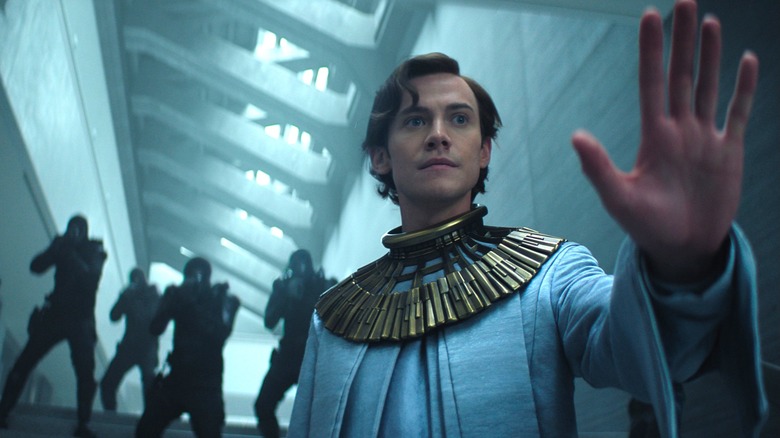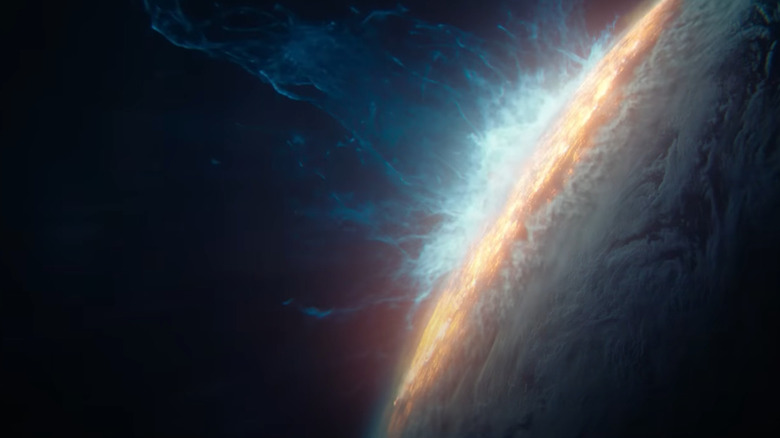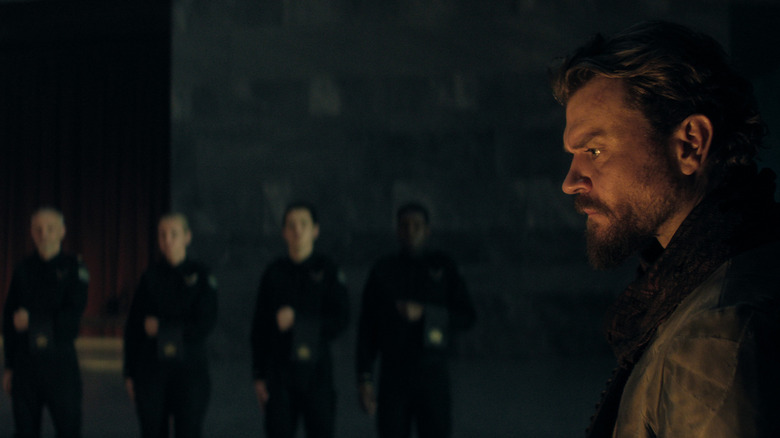Foundation Season 3 Just Beat Star Wars In One Major Way
Do robots dream of electric spoilers? This article discusses major plot details from the latest episode of "Foundation."
Is it possible we've been overestimating the Cleonic Dynasty at the heart of "Foundation" all along? If season 1 of the Apple TV+ series was all about reinforcing their godlike status as genetically perfect specimen, and season 2 showcased what could go awry should they ever stray from their preordained destinies, then season 3 seems to be focusing on the trio most responsible for Empire's death throes. Brother Dawn (Cassian Bilton) has grown so disillusioned with the state of things that he's turned traitor and found himself recruited by Gaal Dornick (Lou Llobell) to secretly further the Second Foundation's agenda. Lee Pace's "himbofied" Brother Dusk (more affectionately known among fans as "Brother Dude") couldn't possibly be less invested in their impending downfall, preferring the company of his drugs and lovers instead. That leaves old, declining Brother Dusk (Terrence Mann) as the one figurehead remotely capable of holding everything together ... and he has mere days left before he's scheduled for immolation, making way for the next generation of malfunctioning Cleons.
Episode 5, titled "Where Tyrants Spend Eternity," brings things to a head as explosively as we ever could've imagined. Under Gaal's guidance (and potentially her own Mentallic mind control), Brother Dawn plays an integral role in her plan against the villainous Mule (Pilou Asbæk). In order to keep him contained, it's crucial that the Cleons order an "enclosure" — essentially a militarized blockade in space – around the planet he took over named Kalgan. However, that requires navigating a tricky political quagmire to get the needed votes, involving blackmail and trickery and even cold-blooded murder. Dawn holds up his end of the bargain to perfection ... only to end up inciting the Mule's wrath, inadvertently placing Empire's fleet all in one convenient location for the Mule to destroy with one well-placed "cobalt spike." One stellar explosion later, both the enclosure and the planet itself no longer exist.
It should quickly dawn on viewers (pun most definitely intended) just how badly Brother Dawn f***ed up — and just how thoroughly "Foundation" improved on a classic "Star Wars" trope. We've seen entire planets get destroyed before, but never to such emotionally devastating effect. Long before the smoke and space debris clears, it's undeniable that "Foundation" has beaten "Star Wars" at its own game.
Star Wars uses planetary destruction as a plot device, not as emotional consequences
Remember in "Star Wars" when Leia Organa finds out her entire home world has been wiped off the galactic map and, rather than stopping in its tracks to reckon with such an unimaginable turn of events, the film breezes along like it was just a minor setback? In many ways, the 1977 classic set the template for how the franchise would go on to approach such significant moments of profound loss. Director J.J. Abrams would famously follow in George Lucas' footsteps with "The Force Awakens" several decades later, only this time using a bigger Death Star (the third version of one in the franchise, for those keeping count) to blast several planets into smithereens. Like the original film, the 2015 sequel hardly even pauses to let this sink in whatsoever. We watch entire populations turn into ash in real time ... and then move on as if nothing ever happened. Quick show of hands: Who can even remember that the main planet destroyed (which looks oddly like Coruscant) is called Hosnian Prime, apparently the capital world of the entire New Republic? Yeah, didn't think so.
How many times in science fiction have we seen mass-casualty events and galaxy-wide threats used to raise the stakes ... and how often does that tactic actually work as intended? Genre writing has historically struggled with the idea of establishing tension while simultaneously increasing scale. At a certain point, the numbers get so abstract that it becomes impossible for audiences to wrap their minds around the innocent lives at risk should our protagonists fail. In the very first episode of "Foundation" season 1, for instance, the destruction of the Sky Bridge (which we learned last week was the doing of Laura Birn's Lady Demerzel) led to the deaths of over 100 million souls on the capital world of Trantor. And in both "Star Wars" movies, entire planets and their populations are annihilated in a matter of seconds. But other than some momentary sadness, did any of that devastation genuinely sink in and make a difference to us?
"Star Wars" can't help but fall flat emotionally in these moments, biting off far more than it can afford to chew; meanwhile, "Foundation" finds ways to treat these game-changing plot turns as, well, game-changers.
Foundation forces us to sit with the tragedy
"Foundation" season 3 finally figures out the key to making such horrific spectacle truly matter by lingering on the tragedy and forcing us to sit with it. First, there's the dawning realization (yes, I did it again) of the magnitude of Brother Dawn's failure. As it turns out, he allowed himself to act as Gaal's unwitting pawn in a game far more vast than he anticipated. By putting his fleet in a position to be wiped out in one fell swoop, Empire has been incapacitated beyond repair and effectively given the Foundation the upper hand as the preeminent galactic power. Worse yet, we become firsthand witnesses to the fallout of his actions. By ruthlessly blackmailing his onetime friend and fellow politician Vynod Tarisk (Sule Rimi) into influencing the vote on the enclosure, which also includes the cold-blooded murder of an eavesdropping sex worker who happened to be in the wrong place at the wrong time, Dawn basically condemns Tarisk's own wife and children to death when the Mule destroys Kalgan in retaliation. And if that weren't bad enough, the real gut-punch arrives when Gaal admits she orchestrated this entire series of events, knowing full well that it would likely lead to Kalgan's destruction. She justifies this as a necessary evil to get Hari Seldon's (Jared Harris) plan back on track, putting the Foundation on stronger footing to dispatch the Mule, but watching our supposed hero make her darkest choice yet is downright chilling.
On multiple levels, what happens to Kalgan and its millions of inhabitants reverberates throughout the downbeat ending of the episode. The faceless populations that blink out of existence are given a name and identity through Councilor Tarisk's doomed family, depicted as collateral damage that could've and should've been avoided. The scope and scale of this error are given genuine weight through Brother Dawn's inner turmoil over what he's done, further emphasized when Tarisk tracks him down and attempts to kill him in a violent burst of despairing vengeance. And our own assumptions are challenged when we find out that, while the Mule is the one who directly murders all those lives on the planet and among the fleet in space, it's Gaal who foresaw and made this happen in the first place. Nothing will ever be the same again.
New episodes of "Foundation" stream on Apple TV+ every Thursday.


